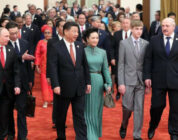Female employees at the Gulf Petrochemical Industries Company, 2017. (Photo courtesy GPIC) posted for media use.
By Sunny Lewis
BAHRAIN, November 14, 2017 (Maximpact.com News) – Dr. Meena Marafi holds one of the few senior jobs occupied by women in the Arab oil and gas industry, but her talent is recognized across the sector.
As executive director of the Petroleum Research Center at the Kuwait Institute for Scientific Research Dr. Marafi was honored with the 2017 “Woman of Achievement” award at the Leadership Excellence for Women Awards and Symposium (LEWAS) gala ceremony on October 9 at The Diplomat Radisson Blu Hotel in Manama, Bahrain..
With a PhD in chemical engineering from Aston University England, she has authored more than 100 publications, including two books, and has been awarded two U.S. patents.
Dr. Meena Marafi, executive director of the Petroleum Research Center at the Kuwait Institute for Scientific Research, earned the 2017 “Woman of Achievement” award from the Leadership Excellence for Women Awards and Symposium (LEWAS).
Dr. Marafi has 13 years of managerial experience as well as 26 years of research experience in petroleum refining processes, catalyst development, deactivation and its waste management.
She was a member of the Kuwait Petroleum Corporation/OPEC Research and Development committee for Clean Fuel Technologies from 2004 to 2012. Since 2015, she has been a member of the Advisory R&D board for the state-owned Kuwait National Petroleum Company, the national oil refining company of Kuwait.
And, Dr. Marafi also was selected as the first woman chairperson from Kuwait at the prestigious 17th World Petroleum Congress this year.
Other talented women, too, were recognized with LEWAS awards.
Fatima Sharif works as warehouse supervisor with Gulf Petrochemical Industries Company (GPIC), the only petrochemical producing company headquartered in the Kingdom of Bahrain.
Sharif is winner of the LEWAS “Leading with Excellence” award. This award honors a professional woman with a degree and five to 15 years of experience in science and engineering, who demonstrates leadership skills that have an impact on the entire company on a corporate level.
“Rising Star” award winner Esra Alkhadhar Alhosani is an instrumentation and control engineer with the Abu Dhabi Company for Onshore Oil Operation.
Following the example of these three exceptional women and the many other honorees, “empower, engage, and elevate” were the three words on the minds of those who attended the LEWAS event October 9-12.
The three-day event, packed with workshops, speakers, panel discussions, and awards, was intended to help women in the oil and gas industry throughout the Gulf Cooperation Council’s six Middle Eastern countries: Saudi Arabia, Kuwait, the United Arab Emirates, Qatar, Bahrain, and Oman.
LEWAS, was created when a group of women decided there needed to be a forum in the Gulf Cooperation Council that provides a place to celebrate women’s achievements, learn from well-respected women, network and improve upon knowledge. LEWAS is an industry initiative of the 4th Middle East Process Engineering Conference.
The event was held under the patronage of Baharain Oil Minister Shaikh Mohamed bin Khalifa Al Khalifa, and it was supported with speakers from the World Petroleum Congress, Boston Consulting Group, Petroleum Institute, and Tata Consultancy Services among others.
For the first time, the gender diversity within the Arab oil industry is receiving researchers’ attention.
At the 22nd World Petroleum Congress in Istanbul in July, the World Petroleum Council and the Boston Consulting Group published the results of their first-of-its-kind study on the status, challenges and opportunies of gender diversity in the oil and gas industry.
Intended to provide a comprehensive baseline on gender balance across the oil and gas industry, the report’s findings are based on detailed personal interviews with more than 60 female and male senior industry executives worldwide, and a survey of about 2,000 male and female industry professionals from a wide range of companies and countries.
Data was provided confidentially to the report’s authors by all major international oil companies and several national oil companies. The authors say they received information from 38 companies with collective revenues of $1.9 trillion and employees representing between 25 percent and 30 percent of the industry’s global workforce.
The authors plan to update this benchmark report every three years in conjunction with the triennial World Petroleum Congress.
One reason why women are not advancing as quickly as some would like is that there is “a shortage of women in STEM education programs, which provide the necessary qualifications for a career in the technical areas of the industry.”
And then, the report states, ” the industry has a poor reputation as a place for women to establish a career; negative views about the industry are common.
Across the Arab oil and gas industry, the report finds that just one percent of all CEO are females.
The report shows that “although men and women start out on an equal footing, women rarely reach the top of the organization. Men in senior positions say that’s due to a lack of qualified female candidates for top positions.
The authors write, “This assessment is probably accurate: among women who have spent many years in the industry and might otherwise be considered suitable candidates for promotion to senior management, many have failed to accumulate the critical experiences that their male colleagues have. Thus, even among women who are still at the comapny after 15 or 20 years, the odds of landing a senior executive job are small: women hold less than 20 percent of these positions.”
“There are wide gaps in perception between men and women regarding the gender-related challenges the women face,” the report states.
For example, write the authors, “men believe that women are generally less flexible than men and therefore less suited to certain roles … But our research shows that women are in fact just as flexible as men, and sometimes even more so.”
Nevertheless, men in the Arab oil and gas industry business appear to fail to understand how tough it is for women to rise in this industry.
The report shows that 57 percent of women said that female emplyees receive less support for advancement into senior positions than male employees; only 24 percent of men agreed.
Then, 56 percent of women surveyed said women are overlooked for senior positions in the oil and gas industry; only 23 percent of men agreed.
The World Petroleum Council and Boston Consulting Group recommend that oil and gas companies work to remove structural barriers to female advancement and develop more high profile female role models to inspire young women and girls.
They recommend that STEM education be promoted among girls and young women, and scholarships and internships be offered to talented candidates.
One of the very few male oil and gas executives to receive a LEWAS award at the October event, Ali A. Al-Meshari, manager of Saudi Aramco’s Exploration and Petroleum Engineering Center – Advanced Research Center (EXPEC ARC), supports that recommendation.
During a panel titled “Narrowing the Gender Gap and Strengthening the Female Pipeline in the Oil and Gas Industry,”
Al-Meshari expressed his support for encouraging the STEM subjects for girls, along with strengthening the female pipeline within GCC companies.
Al-Meshari was presented with the 2017 LEWAS “Corporate Champion” award.
The LEWAS event was exciting for Dalia Abushulaih, who is with Saudi Aramco’s Professional Development Program.
“The workshop really focused on setting goals and creating the first step you need to achieve them,” said Abushulaih. “My personal experience with this workshop was truly remarkable.
“The greatest moment was when I presented to the whole workshop my goal. I hope to find an opportunity in the future, where I am connected to businesses, government, and society to be able to create positive progress that can be heard, learned, and applied in our great Kingdom,” said Abushulaih. “Having the amazing people I was surrounded by to support a dream of mine truly did illuminate my path.”




